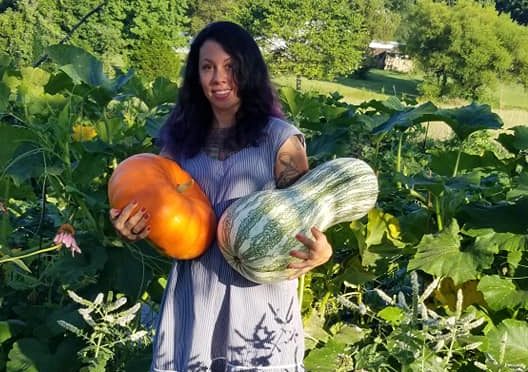Amyrose Foll is fond of quoting the statistic that the human brain can process 1,500 words of speech per minute. And she does her best to pack in each one.
The farmer, food sovereignty activist, lecturer, and founder of Virginia Free Farm has more projects than can fit into the hours of the day—except that she does fit them in, each in its own plot like a garden patch.
The garden plots on her property are numerous, too. There are turkeys, chickens, ducklings, geese, and baby goats in her backyard. Sweet corn, beans, peas, melons, and grains grow in a plot. Some fields are for produce, others for seeds. There’s a food forest that provides pawpaws, persimmons, and maple syrup. There are pigs and goats rotating in behind collards and kale, and a patch with dozens of chickens.
“We call it poultry for the people,” Foll says. People donate the chickens and ducks they can’t keep. Mostly, it’s roosters. “So they bring them here. Everything here has been donated. [Volunteers] will come and help us process like 40, 50 birds at a time. We give away hundreds of roosters because they come every weekend. Sometimes there’ll be like 200 birds in there holding, waiting to get butchered.”
Last year, Virginia Free Farm grew 113,000 pounds of food. “For context, 13,000 pounds is the weight of an African elephant,” Foll says. All of that food was given away.
Foll was a commercial farmer for over a decade until 2017, when she started giving everything away. At the time, most of her income came from her sign and print company, and she could see the food insecurity in her area.
“[Louisa] County has twice the state average of poverty and food insecurity,” Foll says.
The only grocery store in the area didn’t have healthy food options, and the food bank was inaccessible to those who needed it most. Often, she would drive door to door delivering fresh produce, connecting with people on Facebook and Instagram.
As a farmer, Foll says, “I always had extra. If you ask any farmer that does farmers’ markets or even a local grocery store, there’s always extra, and it’s a perishable product. A lot of them will feed it to their animals or compost it. So instead of throwing anything away, I just started giving it away, to the point where my neighbors and friends were like, ‘Jesus Christ, no more eggs and zucchini.’”
Foll, who is Penobscot and Abenaki on her father’s side and grew up near the reservation, identifies with an ethic of sharing wealth rather than hoarding it.
“I feel like food should be a human right,” Foll says. “Instead, organic or local food has become a new mode of conspicuous consumption for the wealthy.”
Halfway through her first year of giving away food, her idea started attracting attention.
“I had just random people coming to me, messaging me asking to help,” she says. “I didn’t ask anybody to do anything, they all came to me and they were like, ‘I love this idea, let’s do it.’”
Farms, community gardens, and collectives in central Virginia, and some farther away, wanted to help grow or distribute free food. Foll found she had a movement on her hands.
“I’ve got an army of badass people that just want to feed people that came to me, and I didn’t even ask them to do it,” she says. “That’s really heartening.”
Virginia Free Farm’s network of farms and gardens includes plots in Rappahannock, Monacan Nation, tribal reservations, Charlottesville, Richmond, Petersburg, Newport News, and Blacksburg. Each one serves a different community. Foll’s original home farm primarily serves the undocumented community and refugee families of Richmond and Charlottesville.
“I’ll grow molokhia, a lot of Turkish eggplants, Syrian and Turkish melons, and okra because we want to be able to provide things for our families that are familiar to them,” Foll says. “You can’t get molokhia anywhere, and they get so happy when they see something that they recognize that’s like home.”
Foll worries about what the refugee women she works with are going to do when their federal assistance runs out and they are left to fend for themselves in an unfamiliar place where they may not speak the language. She remembers how hard it was when she moved to the area as a single mother with no support system and sons to feed. She would have liked to have had help when she needed it, and she knows the difference a stable meal can make to someone who is struggling.
And while Virginia Free Farm prioritizes giving food to marginalized communities that suffer the most from food insecurity, Foll’s primary motivation is that she wants to feed people. “I just like taking care of people,” she says. “It makes me really, really happy.”
